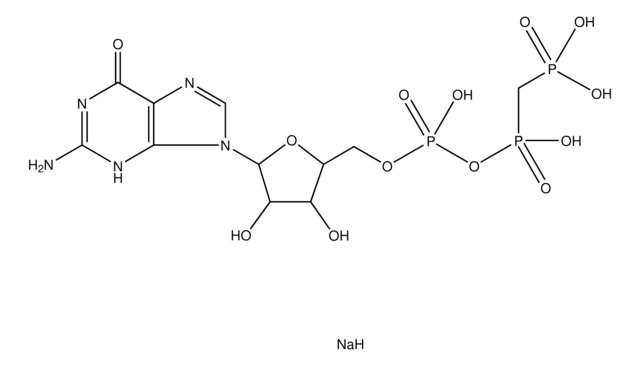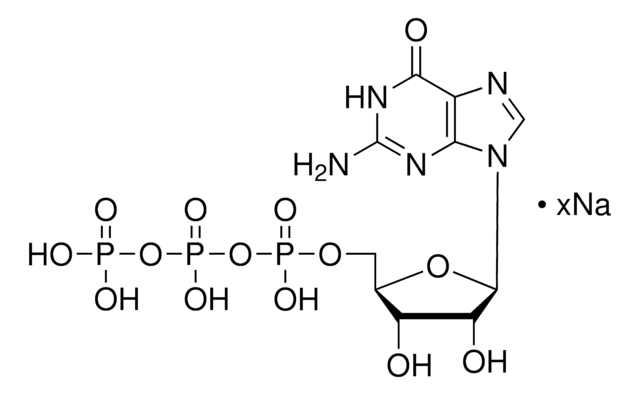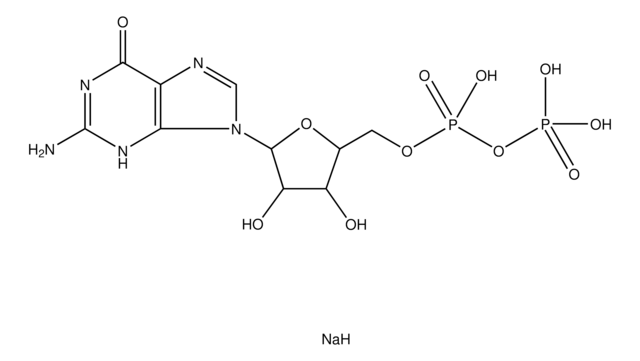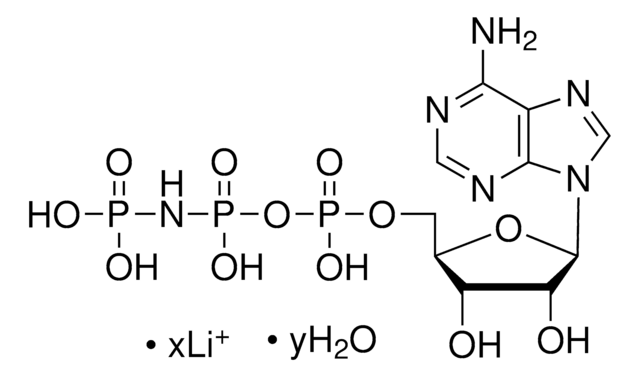G0635
Guanosine 5′-[β,γ-imido]triphosphate trisodium salt hydrate
≥85% (HPLC), powder
Synonym(s):
β:γ-Imidoguanosine 5′-triphosphate trisodium salt hydrate, 5′-Guanylyl-imidodiphosphate trisodium salt hydrate, GMP-PNP, Gpp(NH)p
About This Item
Recommended Products
biological source
synthetic (organic)
Quality Level
Assay
≥85% (HPLC)
form
powder
color
white
solubility
H2O: 50 mg/mL
shipped in
dry ice
storage temp.
−70°C
SMILES string
[Na+].[Na+].[Na+].Nc1nc(O)c2ncn([C@@H]3O[C@H](COP([O-])(=O)OP([O-])(=O)NP(O)([O-])=O)[C@@H](O)[C@H]3O)c2n1
InChI
1S/C10H17N6O13P3.3Na/c11-10-13-7-4(8(19)14-10)12-2-16(7)9-6(18)5(17)3(28-9)1-27-32(25,26)29-31(23,24)15-30(20,21)22;;;/h2-3,5-6,9,17-18H,1H2,(H,25,26)(H3,11,13,14,19)(H4,15,20,21,22,23,24);;;/q;3*+1/p-3/t3-,5-,6-,9-;;;/m1.../s1
InChI key
QGJNRMUNXAROIT-CYCLDIHTSA-K
Looking for similar products? Visit Product Comparison Guide
General description
Application
Biochem/physiol Actions
Signal Word
Warning
Hazard Statements
Precautionary Statements
Hazard Classifications
Eye Irrit. 2 - Skin Irrit. 2 - STOT SE 3
Target Organs
Respiratory system
Storage Class Code
11 - Combustible Solids
WGK
WGK 3
Flash Point(F)
Not applicable
Flash Point(C)
Not applicable
Personal Protective Equipment
Choose from one of the most recent versions:
Certificates of Analysis (COA)
Don't see the Right Version?
If you require a particular version, you can look up a specific certificate by the Lot or Batch number.
Already Own This Product?
Find documentation for the products that you have recently purchased in the Document Library.
Customers Also Viewed
Our team of scientists has experience in all areas of research including Life Science, Material Science, Chemical Synthesis, Chromatography, Analytical and many others.
Contact Technical Service


![Guanosine 5′-[γ-thio]triphosphate tetralithium salt ≥90% (contains < 10% GDP, HPLC), powder](/deepweb/assets/sigmaaldrich/product/structures/131/514/e3025b6a-cb52-4818-b20f-98efac485c1a/640/e3025b6a-cb52-4818-b20f-98efac485c1a.png)





